Recently, the Virginia Department of Education (VDOE) threw the English Department for a bit of a loop. Just last year, the VDOE required that schools across the state, especially their English departments, shift their curriculum dramatically.
In the past, English 11 teacher Ashlee Payne had her coursework set up to cover different literary eras and they often lined up with the Virginia and U.S. History teachers’ lessons.
However, it’s changed to where she’s required to base her units around literary ideas and concepts. Principal Dr. Mike Craft, who is also the Director of Secondary Instruction, gives us some insight.
“The department is going for a more holistic approach… Instead of doing one standard at a time, they’re combining several into one assignment,” said Craft.
But due to this late change, the English department did not have the opportunity to slowly incorporate this into their coursework – they had to swap it.
“The entire English department met three times over the summer. I spent a huge chunk of my summer redoing the curriculum,” said Payne.
Normally, the VDOE will give teachers a “crosswalk” year, where they can slowly incorporate their new coursework and curriculum, but this year, Virginia did not give them that luxury.
Other grade levels are “doing a slower transition, because they have some leeway,” said Payne.
Though not everyone is upset about the change, some wish there were more notice to prepare, especially because there is an issue of teacher burnout post-COVID, as well as a teacher shortage.
“Any time you change the standards, it’s not easy on the teachers, but our teachers have done a great job,” said Craft.
This change towards inquiry-based learning is impacting teacher evaluation as well. Though the change is new, the teachers will still be evaluated according to how well they respond to and score on the work. The goal is that at some point, the history department will undergo this as well so that it continues to align with the English coursework.
This dramatic shift has been imposed on more than just 11th grade English. Every grade level has received new standards. And with these new standards, the SOLs and benchmarks have changed as well.
“SOL scores factor into my evaluation as a teacher,” said Payne.
This has left teachers feeling underprepared.
“It was Ms. Sheets (another English teacher) and I that were driving this for a long time because we had the time to be like ‘oh, we need to panic’,” said Payne.
“Initially it’ll be hard on the teachers, because they have to change their curriculum. Once that’s done, it’ll be all around good for everybody. Anytime you do change, it’s hard on people,” said Craft.
The lack of clear guidance from the VDOE has been unhelpful in explaining how teachers are supposed to construct their lessons to fit the new standards of learning.
For future changes, “I hope they’ll get it out sooner next time, and that it’ll be clearer,” said Craft.
In such a short time period, teachers have had to worry about reconstructing their entire curriculum
and getting evaluated on how it might ensue.
“The information that was coming out was not very clear, and late in the year, which they do all the time, so that’s frustrating. That’s no fault of our teachers,” said Craft.
Though the VDOE has imposed these standards on English departments all over the state, administration does believe that this change will be beneficial to students. Having to reconstruct the curriculum is the hard part. The sudden shift has certainly posed challenges for teachers, but the hope is that this new approach will benefit both teachers and students. The resilience of our teachers will be a defining factor in the integration of these standards.
To view these new standards, visit the Virginia Department of Education.








